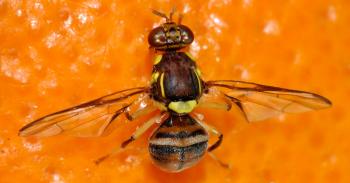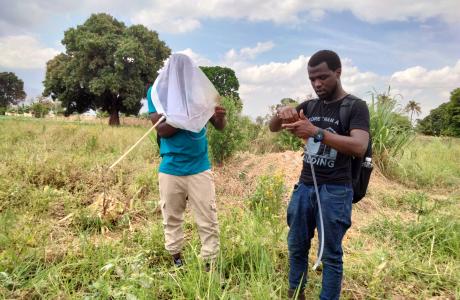Fruitflies: a major threat to fruit and vegetable production
A new international project will try to predict potential pests, produce reliable detection and identification tools and develop an innovative pest management system.

Female Bactrocera dorsalis, one of the target fruit fly species of the FF-IPM project © A. Rodriguez
Globalisation and climate change
Fruit fly pests have spread from one continent to another and are considered as one of the major threats for horticultures in both tropical and temperate regions. The number of these invasive pests is on the rise because of an increase in global trade and travel along with climate change.
A new EU funded project within the H2020 programme with partners from over 17 countries throughout the world, including the RMCA, aims to prevent and mitigate the impact of fruit fly pests and secure sustainable food production in Europe.
The project focuses on three invasive fruit flies that form a major threat: the oriental fruit fly (Bactrocera dorsalis) and the peach fruit fly (Bactrocera zonata), both of Asian origin but already widespread in the Middle East and Africa. The third species, the Mediterranean fruit fly (Ceratitis capitata), is a well established pest in the Mediterranean basin but is spreading further northwards in Europe because of changing climatic conditions.
Prediction, detection & identification
The project aims at developing tools and databases that can reliably predict where and when invasive pests are likely to enter Europe. By obtaining the necessary biological data, spatial models that can predict likely points of entry and invasion routes of the target pest species, will be developed.
Secondly, the project will produce rapid detection and identification tools. This includes electronic traps for automated detection and ‘e-Nose’, electronic noses to detect infested fruit in imported cargo. Efficient pest management also entails correct identification of detected or intercepted flies in reliable, easy, fast, and relatively cheap ways.
”Based on our expertise in the identification of fruit flies in Africa, the RMCA will coordinate the development of these tools, which are based on both morphological and genetic characteristics. We will also perform population genetics research to trace the origin of potential invasions”, explains entomologist Marc De Meyer, the project's technical manager. “Some of these potentially invasive pests were already introduced in Africa where they caused extensive economic damage. The experience we built up over the years, through collaboration with African partners, will be an asset. Some of these partners are actually participating in this programme.”
Innovative ‘off-season’ pest management
The project will also develop a management toolkit to eliminate fruit flies, focusing on Integrated Pest Management (IPM). This comprises a diverse set of methodologies that are considered benign, such as natural predators and parasitoids, without negative consequences either on human health or the environment.
The project is innovative in targeting the use of such IPM tools in the ‘off-season’. Fruit flies demonstrate a decline in population levels during the winter periods. "By targeting the overwintering generation, we will prevent population growth later in season and hence reduce economic costs: fly populations will not have attained the high number of flies which would necessitate much more intensive control methods”, explains De Meyer.
Article based on: Marc De Meyer, ‘Introduction to FF-IPM objectives and approaches’, FFIPM Bulletin, September 2020.
More info about the project


